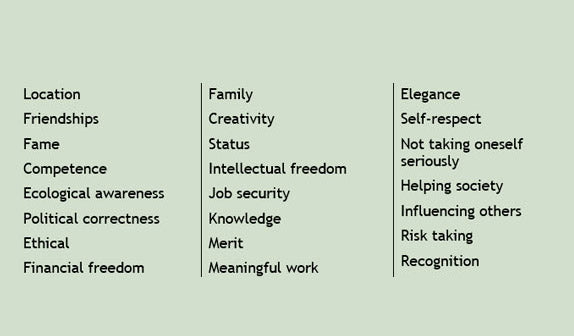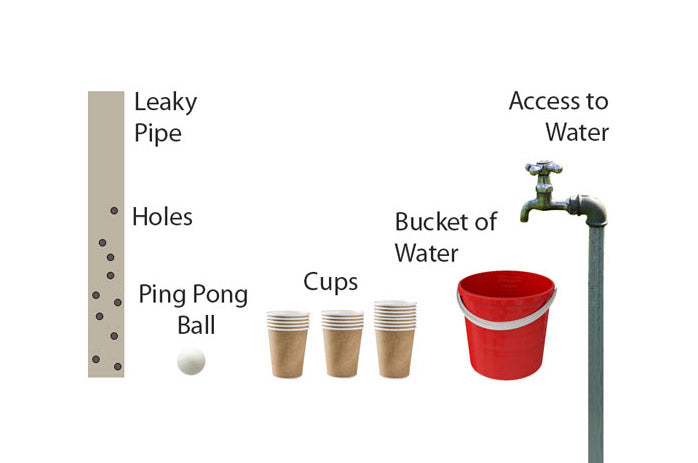Purpose
Self-awareness is one of the important competencies within emotional intelligence. Self-awareness is about understanding your strengths, limitations, attitudes, values and motivations. In this exercise, delegates have an opportunity to reflect on their values and see exactly what matters to them the most. Self-awareness helps people understand what they believe now and how this might have changed from the past. Hence, this exercise can be conducted periodically, such as once a year, and you can expect to get different results each time. Comparison of these results on their own can be quite educational and further help to increase self-awareness.
Objective
Go through the values provided and select the best ones based on the instructions provided.
What You Need
- A copy of the “Value List” provided below.
Setup
- Explain to delegates that in this exercise they will be examining themselves in respect to a range of values. By understanding the values, they will boost their self-awareness.
- Provide a copy of the “Value List” to each delegate.
- Ask delegates to identify ten values that they strongly believe in or that are important to them. The list is provided as a reference only. They can add any other value they feel strongly about to the list and select it as part of their most important ten values. Ask them to write these values on a separate piece of paper. For best results, they should be as honest as they can. They should not pick values to show off, for being politically correct or popular fashion. They should choose only based on what’s important to them.
- Allocate about 5 minutes for this part.
- Now in the next step, ask the delegates to select only five values from the ten they have selected. This is now much harder, but the selection process will force them to see what they truly value the most.
- Allocate 2 minutes for this part.
- Allocate a few more minutes for reflection so delegates can think about what their choices really mean to them.
- Bring back everyone together and ask them to share their values and observations one by one. If the delegates know each other or are part of a team, sharing important values can be quite educational as people can see what’s most important to other team members.
- Follow with a discussion.
Timing
Explaining the Exercise: 2 minutes
Activity: 5 min selecting ten values + 2 min selecting five values + 3 min reflection = 10 minutes
Group Feedback: 10 minutes
Discussion
What did you learn about yourself in this exercise? Was it difficult to select the ten values? How about narrowing it down to five values? Did you add any new values to the list? What did you think of other delegates’ values? If you know the other delegates, did their choices match your expectations? If you have gone through this exercise in the past, were your values any different? What does this suggest?
Value List
|
Love and care Community Variety Stability Efficiency Friendships Fame Competence Ecological awareness Political correctness Ethical behaviour Financial freedom Financial security Achievement Adventure Perfectionism Competition Order and law Privacy |
Growth Being rich Inner happiness Honesty Selflessness Family Creativity Status Intellectual freedom Job security Knowledge Merit Meaningful work Routine Leadership Independence Loyalty Respecting nature Close relationships Challenge |
Power Personal development Religion Reputation Novelty Elegance Self-respect Modesty Helping society Influencing others Risk taking Recognition Certainty Sex Time Truth Working for yourself Working with others Gratitude |
Comments
By Dr. Jayashri Shetty @ Friday, July 3, 2020 9:09 PM
Hi!!
I simply love trying your Exercises in my classroom and they all work out very well for me. Ijust tried out the Self Awareness exercise from the broad field of Emotional Intelligence and there was an animated discussion by students in my virtual classroom.
Everything was good and went on as anticipated. Since I am in the field of Training, I could bring it to a logical conclusion but i think its important for you to set forth the learning outcomes at the beginning of the exercise and then advise the trainers on how to follow up in measuring if the outcomes have been fulfilled.
I see some of the trainers do a very good job of the exercises and then draw a blank when they have to conclude or give feedback while wrapping up. Sadly, they are not able to tell students as to where the tunnel had led to.
It will be nice if you can include *the advice* which trainers ought to give their enthusiastic students while wrapping up the learning.
By Ehsan Honary @ Monday, July 6, 2020 11:57 AM
Thanks Dr. Shetty for the comments. Completely agree that feedback at the end is quite important as well as managing discussions that ensues. Here, in each exercise we provide a session on "discussion" where the trainer can ask a number of questions to raise awareness of important concepts covered in the exercise. In general we assume that the trainer in a subject expert and so knows how to handle the direction and why students are subjected to the exercise to begin with. Your point is very valid however, and thanks for sharing.
Soft Skills Training Materials
Get downloadable training materials
Online Train the Trainer Course:
Core Skills
Learn How to Become the Best Trainer in Your Field
All Tags
Training Resources for You

Course Design Strategy
Available as paperback and ebook

Free Training Resources
Download a free comprehensive training package including training guidelines, soft skills training activities, assessment forms and useful training resources that you can use to enhance your courses.

Our Comprehensive Guide to Body Language

Train the Trainer Resources
Get Insights - Read Guides and Books - Attend Courses
Training Materials
Get downloadable training materials on: Management Training, Personal Development, Interpersonal Development, Human Resources, and Sales & Marketing














Leave a comment
All comments are moderated before being published.
This site is protected by hCaptcha and the hCaptcha Privacy Policy and Terms of Service apply.